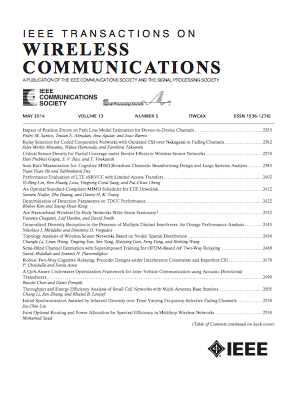ris辅助多用户MIMO-OFDM系统级联信道估计的混合矢量消息传递
IF 10.7
1区 计算机科学
Q1 ENGINEERING, ELECTRICAL & ELECTRONIC
引用次数: 0
摘要
研究了可重构智能曲面(RIS)辅助多用户多输入多输出正交频分复用(OFDM)系统中级联信道估计的基本问题。为了解决现有方法所需的高导频开销,我们引入了适当的辅助变量,将接收到的信号模型分解为一个基于子载波的双线性子模型和两个关于MU-to-RIS和RIS-to-base-station (BS)级联信道的线性子模型。所提出的模型分解保持了两个级联通道的矩阵分解结构,避免了现有方法中参数展开的问题。此外,在两个线性子模型中,级联信道被转换到延迟角域,以利用联合稀疏性。基于所建立的模型,我们将MU-to-RIS和RIS-to-BS信道矩阵的同时估计问题视为双线性估计问题。为了解决这个问题,我们制定了一个贝叶斯推理框架,并开发了一个混合消息传递(HVMP)算法,利用贝叶斯方法实现近似贝叶斯推理。值得注意的是,HVMP算法迭代地推断两个级联信道,其中估计每个级联信道矩阵的协方差来表征矩阵元素的相关性。仿真结果表明,该算法以较低的导频开销实现了准确的信道估计,而现有的基线方案性能较差。此外,该算法可以接近MU-to-RIS(或RIS-to-BS)信道的估计预估界,该估计界假设完全了解RIS-to-BS(或MU-to-RIS)信道。本文章由计算机程序翻译,如有差异,请以英文原文为准。
Hybrid Vector Message Passing for Cascaded Channel Estimation in RIS-Aided Multi-User MIMO-OFDM Systems
This paper investigates the fundamental problem of cascaded channel estimation in reconfigurable intelligent surface (RIS) aided multi-user (MU) multiple-input multiple-output (MIMO) orthogonal frequency division multiplexing (OFDM) systems. To address the high pilot overhead required by existing methods, we introduce appropriate auxiliary variables to decompose the received signal model into a subcarrier-wise bilinear sub-model and two linear sub-models with respect to the MU-to-RIS and RIS-to-base-station (BS) cascaded channels. The proposed model decomposition maintains the matrix factorization structure of the two cascaded channels and avoids the problem of parameter expansion in exiting methods. In the two linear sub-models, in addition, the cascaded channels are transformed into the delay-angle domain to leverage the joint sparsity. Based on the established models, we consider the problem of simultaneously estimating the MU-to-RIS and RIS-to-BS channel matrices as a bilinear estimation problem. To tackle this problem, we formulate a Bayesian inference framework and develop a hybrid message-passing (HVMP) algorithm to achieve approximate Bayesian inference by leveraging the Bethe method. Notably, the HVMP algorithm infers the two cascaded channels iteratively, where the covariance of each cascaded channel matrix is estimated to characterize the correlation of the matrix elements. Simulation results show that the proposed algorithm achieves accurate channel estimation with low pilot overhead while state-of-the-art baseline schemes exhibit poor performance. Furthermore, the proposed algorithm can approach the estimation oracle bound of the MU-to-RIS (or RIS-to-BS) channel which assumes perfect knowledge of the RIS-to-BS (or MU-to-RIS) channel.
求助全文
通过发布文献求助,成功后即可免费获取论文全文。
去求助
来源期刊
CiteScore
18.60
自引率
10.60%
发文量
708
审稿时长
5.6 months
期刊介绍:
The IEEE Transactions on Wireless Communications is a prestigious publication that showcases cutting-edge advancements in wireless communications. It welcomes both theoretical and practical contributions in various areas. The scope of the Transactions encompasses a wide range of topics, including modulation and coding, detection and estimation, propagation and channel characterization, and diversity techniques. The journal also emphasizes the physical and link layer communication aspects of network architectures and protocols.
The journal is open to papers on specific topics or non-traditional topics related to specific application areas. This includes simulation tools and methodologies, orthogonal frequency division multiplexing, MIMO systems, and wireless over optical technologies.
Overall, the IEEE Transactions on Wireless Communications serves as a platform for high-quality manuscripts that push the boundaries of wireless communications and contribute to advancements in the field.

 求助内容:
求助内容: 应助结果提醒方式:
应助结果提醒方式:


